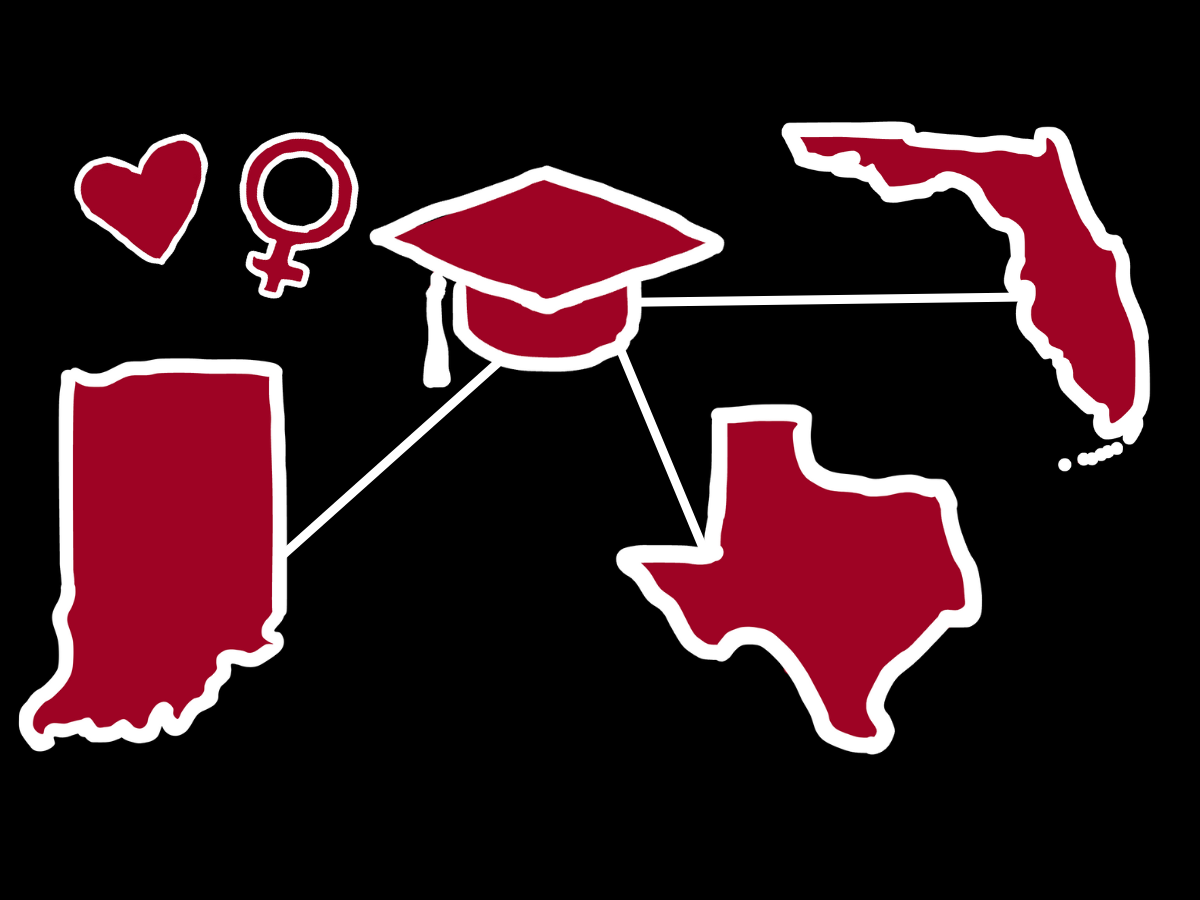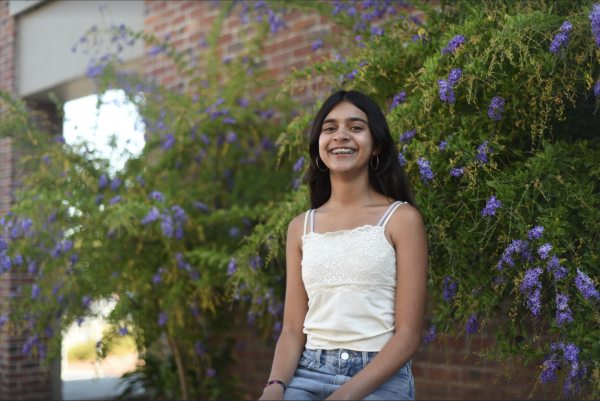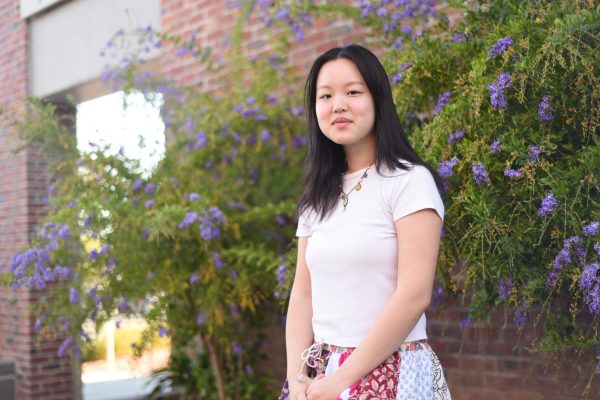Since freshman year, senior Saahithi Kancherla has stuck to a strict no-red-states rule when it comes to applying to colleges, with the exception of UT Austin due to its familiar racial makeup. Kancherla says reproductive rights legislation is a huge factor in determining where she considers going, as her bodily autonomy is not something she is willing to risk.
“I would really value that safety of knowing that if something were to happen to me, I would have access to the health care that I need in order to grow from that,” Kancherla said. “So that one situation doesn’t turn into a life that I don’t want to live.”
Senior Riya Murthy has also shaped her college list to reflect her political values, considering the implications of having a queer identity in a conservative state. Beyond the direct effects of policies, Murthy believes that when a state’s legislation violates the individual freedoms of a specific group of people, it reflects that state’s beliefs around personal autonomy for everyone.
“I want to be safe in the college I go to,” Murthy said. “As long as there’s even a chance I might have my rights infringed upon or that I might feel unsafe around the people in my area, I don’t want to put myself in that position, especially for an extended period of time. More than the policy itself, it’s the public sentiment in these states — people who are denying my rights as a person or denying my identity. I don’t want to go and interact with those sorts of people, as far as I can help it. I don’t want to talk to people who don’t believe in my rights.”
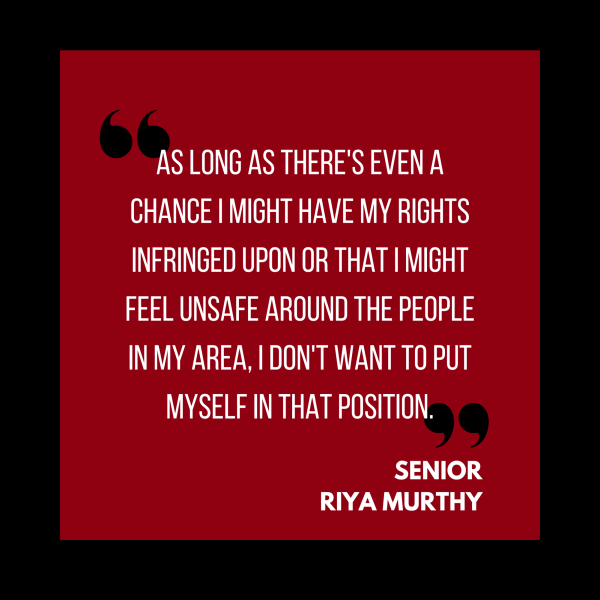
English Teacher and AVID Adviser Lynn Rose encouraged her non-binary child, Beck, to stay in California for college. She perceives California to be unfailingly liberal, and believes that attending college in-state would ensure Beck’s rights and safety as a member of the LGBTQ+ community.
“If Beck ever moved out of state, depending on what state, just being non-binary and falling under that trans umbrella makes me worry about their safety and access to health care and gender-affirming care,” Rose said. “It’s important to go to school in a community where you feel safe and accepted and, if you’re queer, where you can find those spaces where queer people are accepted, either on campus or out in the community.”
Murthy prioritizes exposing herself to a diverse community of people from various backgrounds, saying an experience interviewing various strangers in New York for a photo collection inspired her to leave the Bay Area bubble she is in. Because Murthy aims to use college as an opportunity to broaden her perspective, she views living in states that uphold singular, close-minded ideologies as preventing her exploration and lacking wide representation.
Rose views close-mindedness within state education especially with the increase of book bannings as concerning. She says a diverse curriculum that consists of information that might be hard to handle, is still important for students to learn. This includes topics like slavery and other forms of discrimination that were enforced by America’s prior legislation and are being banned from education due to it being “too sensitive.” Seeing a video of schools being forced to dump their books in Florida or countless cases where teachers have been forced to shape curriculum around religious teachings reaffirmed Rose’s opinions on seeking education that encompasses what you believe in.
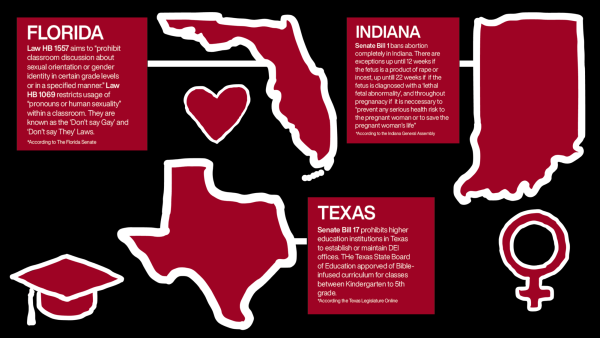
“We teach ‘Aristotle and Dante Discover the Secrets of the Universe,’ which is an LGBTQ+ young adult book, but just because a child reads that book doesn’t mean it’s going to ‘turn them gay,’” Rose said. “It helps us to understand other populations that might not be like us — whether we’re gay or straight, whoever we are, we’re human. We’re human beings. It’s part of the human experience.”
To Kancherla, location is not only a priority in college — she says environment will always remain important to her as she goes into her adult life and settles down. Kancherla wants to ensure the generations after her have protected reproductive rights and access to education that will allow them to have diverse perspectives, so she plans on raising her family in a liberal environment.
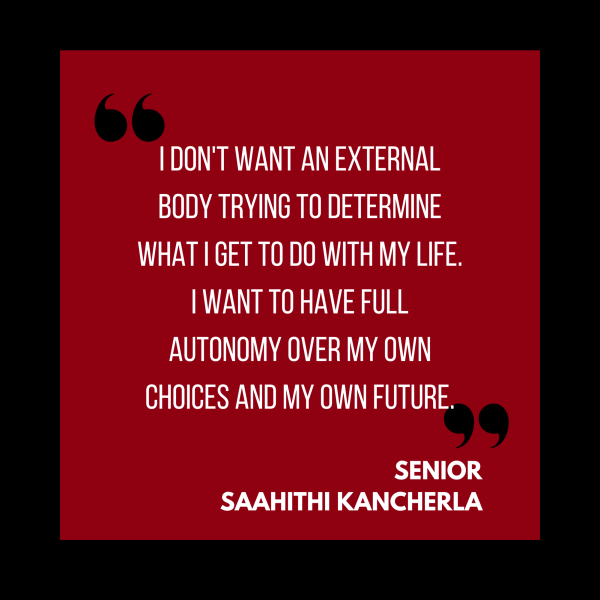
“I’d say price and inflation are things that can change easily and a single law isn’t going to set the tone for an entire generation of people,” Kancherla said. “But with the book bannings that are happening and certain topics not being allowed to be discussed in classrooms, I feel like restrictive behavior is really harmful to education. That’s what I’m more passionate about, because that can actually affect generations and generations, and then also the access to health care, of course, is something that can affect someone for the rest of their life. I would want to live in a place where my kids will grow up and be safe under those kinds of laws.”
For Murthy, choosing a college is about finding the balance in a location that is diverse but also safe for minorities and marginalized individuals like herself. For Rose and her child Beck, it’s about finding a place where transgender rights and freedoms are protected. For Kancherla, it’s about staying in a place where her future can grow the way she wants it to and the generations after her can live freely.
“My biggest concerns are mainly that I’m protected, and I have the right to choose what happens to me and my future, and I have the right to choose what to learn about and what I don’t want to learn about,” Kancherla said. “I don’t want an external body trying to determine what I get to do with my life. That’s my main thing — I want to have full autonomy over my own choices and my own future.”




